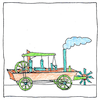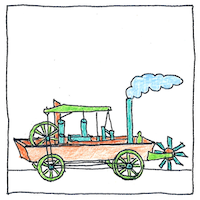Oliver Evans
mechanics
thermodynamics

|
Oruktor Amphibolos
Oliver Evans patented a new steam engine but had some difficulty finding a use for it. He convinced the Philadelphia Board of Health that he could build and operate a steam-powered dredge to clear the harbor. He built his dredger in a flat-bottomed scow thirty feet long, twelve feet wide, so that the finished machine with its paddlewheel weighed about seventeen tons. Having no way to move it, he put it on four wheels, which collapsed from the weight. He installed more heavy-duty wheels and connected them to the engine with a belt. Thus he was able to move the dredger under its own power through the streets to the Schuylkill River, the first automobile in the United States and the first amphibious craft in the world; however, it proved to be ineffective as a dredger.
Mars Works
Evans named his factory after the Roman god of war and employed thirty-five workers to build heavy machinery, castings, and custom-made steam engines of his own designs. The works included an iron foundry, a moldmaker’s shop, a millstone maker, blacksmith’s shops to work wrought iron, and a six-horsepower steam engine to grind and bore castings. The Mars Works built over a hundred steam engines. It cast naval canons for the War of 1812 and built steam engines for the Philadelphia Mint in 1816.
Obscure iron artifacts of the nineteenth century
Some of the finest eggs that Fabergé made were made of iron, lighter than gold! The first man-made hummingbird that could fly was fashioned of sixteenth-inch plate iron. The more durable pirate peg legs were iron, but were heavily oiled to keep from rusting. The first cast-iron computers were installed in Captain Nemo’s Nautilus. Iron, the most common element on earth, was used not only for nails, swords, and chains. Wrought and cast iron were the plastics of the nineteenth century, used for everything from pens and toothpicks to the stays of ladies’ corsets. What iron works of the time couldn’t make from iron was hardly worth writing about.



Oruktor amphibolos is Greek for amphibious dredger. Oliver Evans was a prolific inventor, but it might be said that any invention with a great name is a great invention. But I can’t decide. If he named it something in English, such as “autodredger,” would it be better known?
See also in The book of science:
Readings in wikipedia:
Other readings: